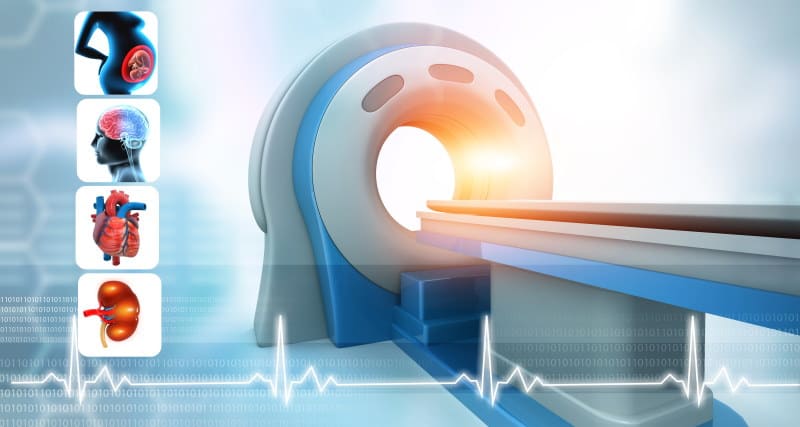There is an increased concern about high levels of exposure to radiation and its effects on pregnant women. Pregnant women are at high risk since the fetus is still under development. As a result, pregnant women are looking for ways to protect themselves and their unborn child.
In this article, you learn some of the tips you can use to protect yourself and your unborn child from radiation exposure.
Radiation Exposure During Pregnancy
Pregnant women are at high risk of exposure to two forms of radiation: non-ionizing radiation and ionizing radiation.
1. Non-ionizing Radiation
Household appliances and other electronic devices emit non-ionizing radiation. This form of electromagnetic radiation is everywhere making it difficult to avoid exposure. It includes radiation from various human-made sources like home appliances and communication equipment such as high-voltage powerlines, cell towers, microwave ovens, radar, TVs, electric blankets, smart devices, etc.
These electronic devices emit EMFs at different frequencies and can be extremely harmful to your unborn child. Wireless devices emit dangerous Radio Frequency (RF) radiation, microwaves, and Bluetooth radiation.
Exposure to higher doses of non-ionizing radiation during the early stages of fetus development may lead to birth defects, death, genetic damage of DNA cells, and increased risk of cancer later in life.
2. Ionizing Radiation
Ionizing radiation from gamma rays, x-rays, and other medical procedures in your workplace are very harmful to fetus development. It can cause mental retardation, malformations, and permanent growth retardation on the fetus.

The effects of this type of radiation depend on the level of exposure and fetal development stage. Therefore, you should tell your health care provider that you’re pregnant before undertaking any test that uses radiation and x-rays.
If you work around radioactive materials, you need a radiation detector. This will help you know the amount of radiation exposure on a daily basis. There are a lot of changes in radioactive rooms and it’s important to review radiation amounts within the environment on a regular basis.
In most cases, a dosimeter can be a great help as it helps you know the daily dose of radiation within your surrounding environment. You can put a dosimeter under your lead apron and record the amount of radiation when performing an x-ray on a patient.
How Radiation Affects Your Baby During Pregnancy
Your body is capable of protecting your baby from the low amounts of radiation you’re exposed to everyday. Low levels of radiation exposure don’t have any harmful effects on your unborn baby or cause any birth defects.
However, exposure to high levels of radiation during pregnancy can contribute to various birth defects. The health effects of radiation exposure on the fetus depends on the radiation dose and for how long you are exposed. Radiation can be transmitted to the body from both internal and external sources. You can also inhale or ingest radiation from radioactive substances that enter your system.
Higher doses of a radioactive substance may affect maternal tissue around the uterus such as the bladder, thus affecting fetus development.
For example, radioactive elements can get into your bloodstream and get transferred to your baby through the umbilical cord. Radioactive material can also accumulate close to your uterus or near your bladder and irradiate the fetus.
The severity of the radiation effects depends on the gestation age of your fetus and the amount of radiation exposure. The fetus is more sensitive to electromagnetic radiation exposure during the early development stages of between 2 and 18 weeks.
Health consequences can be severe and sometimes can make the mother sick.

Effects of Radiation during Pregnancy
High doses of radiation exposure during this period can:
- cause birth defects;
- cause miscarriage that occurs before 20 weeks of pregnancy;
- slow growth of the baby;
- increase the risk of certain types of cancer; and
- affect brain development of your baby.
Pregnant women exposed to extremely large amounts of radiation may experience high fever, fatigue, hair loss, diarrhea, and bloody stools.
How To Protect Yourself From Radiation Exposure
1. Increase distance and limit the time
Maintaining the distance between you and the radiation-emitting device is a great way to protect yourself and your unborn child from exposure. The further you go from a radiation-emitting device, the lower the exposure levels.
Reducing the time you spend near radiation-emitting devices is also another great step to reducing your exposure levels. Limiting radiation exposure time reduces the radiation dose from various EMF sources.
Therefore, maintaining distance and reducing exposure time is the most effective means of reducing radiation exposure. Here are some specific examples of how to reduce your exposure.
- When watching TV sit at least 5 feet away from it.
- When the microwave is running, maintain a distance of at least 3 feet.
- Do not sit near the back of a computer since computers emit radiation from the rear. If you are in a workstation that requires you to sit behind your colleague’s computer screen, you should consider moving so you can maintain some distance.
- You should also reduce the amount of time you spend near a copier machine or other electronic devices. Although there is no significant evidence that the machine can have negative effects on your fetus, this is an extra precaution.
2. Use of shielding material
Putting a shielding fabric or protector between you and the radiation source offers immediate protection against electromagnetic radiation. Shielding material helps lower your radiation exposure from various EMF sources.
Always know different EMF sources and keep them shielded. Different electronic devices emit electromagnetic radiation at different frequencies.
If you use your laptop more often while on the go, you can invest in a laptop shield to protect you against EMF radiation. For example, the DefenderPad Laptop Radiation Shield uses Ultra Armor+ Technology to block radiation emitted by your laptop. It reduces your exposure to radiation by 99%.
You can read my detailed article on the best laptop radiation shields you can use to protect yourself against EMF radiation.
You may also consider whole-house EMF protection from various EMF sources.
3. Wear a protective baby belly band
Since EMF radiation is part of our life and it’s everywhere you go, you can use an anti-radiation belly band to shield radiation exposure to the fetus. Anti-radiation belly bands create a safe environment for your fetus to develop during pregnancy so you don’t have to worry about daily exposure to radiation and the risks long exposure can have on your unborn baby.
There are different belly bands in the market. Some are tested and certified in FCC approved laboratories. Always make sure you get the best anti-radiation belly band that is soft and comfortable to wear. It should also be able to support your growing belly.
If you haven’t checked my detailed article on top belly bands for EMF protection, you should! There you can have a look at the different belly bands you can buy.
4. Use anti-radiation blankets
Another way you can protect yourself while pregnant is by using an anti-radiation blanket that protects you from EMF exposure. The protective blanket can be used before and after the delivery of your baby.
You can use the blanket under a normal blanket or cover yourself with it when sitting on the sofa, playing card games or watching a movie with a laptop that doesn’t have a protective shield.
You can read my detailed article on the best EMF shielding blankets to learn more on how to choose the right blanket for shielding against EMF radiation.
Ways to Reduce Exposure from Ionizing Radiation
- If you have any elective medical procedure that requires you to have an x-ray, postpone it until after you give birth.
- Before any x-rays, let the doctor or your dentist know you’re pregnant, and that you would not wish to proceed with it.
- If it’s absolutely vital to have the x-ray, discuss with your radiologist the best option you can use to reduce radiation exposure. Most modern x-ray equipment emits a lower amount of radiation than older units, making them safer for pregnant women.
- You can also use a lead apron to reduce radiation exposure to other parts of your body. Lead aprons attenuate radiation by about 95% thus the amount of radiation exposure is so little that it can’t have any health effects on the growing embryo. If it’s necessary to undergo a medical diagnosis via x-ray, you should use lead blankets to cover your body and reduce the radiation dose you receive from the radiation-emitting device.
- If you work as a radiologist, technician, or with radiation equipment, you should consider taking an early leave or change your job responsibilities to ensure you and your baby are safe during pregnancy. Alternatively, you can ensure radiation doses remain below 1mGy in the x-ray department.
- Pregnant technicians working in the diagnostic radiology department should consider transferring to the CT scans department or any other department with less radiation exposure.
- In cases of radiation emergencies like the presence of radioactive materials, you should stay inside a building so as to reduce radiation exposure. Ensure all windows and doors are closed. With time, radioactive materials become weaker so staying inside for at least 24 hours can lower your risk of exposure.
Conclusion
Radiation exposure affects your body in different ways. Pregnant women are at high risk of exposure. If your body absorbs more radiation, it will cause various health effects to your unborn baby and in some cases, miscarriage. Therefore, if you’re pregnant, you should take some measures to protect yourself and your unborn child from radiation exposure.


